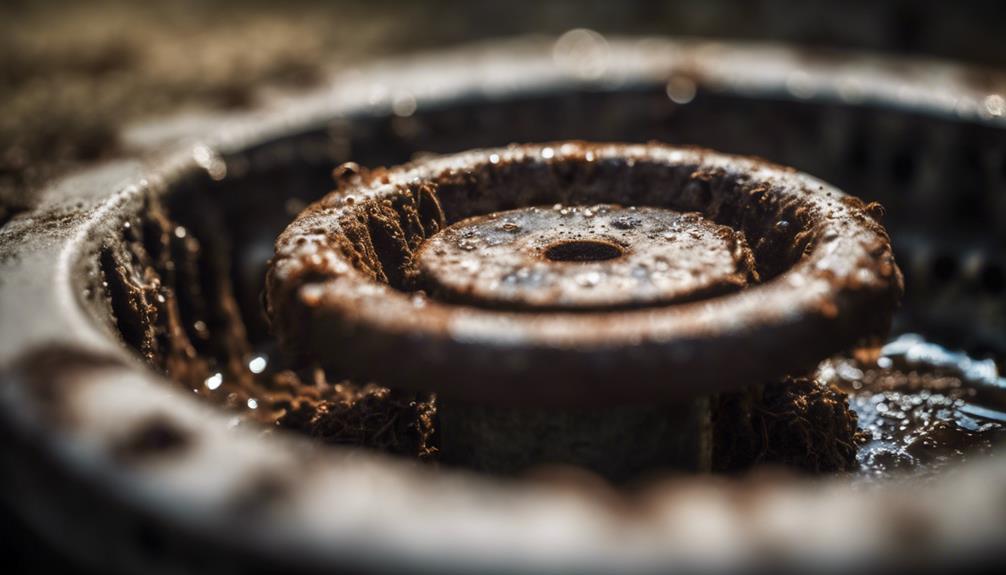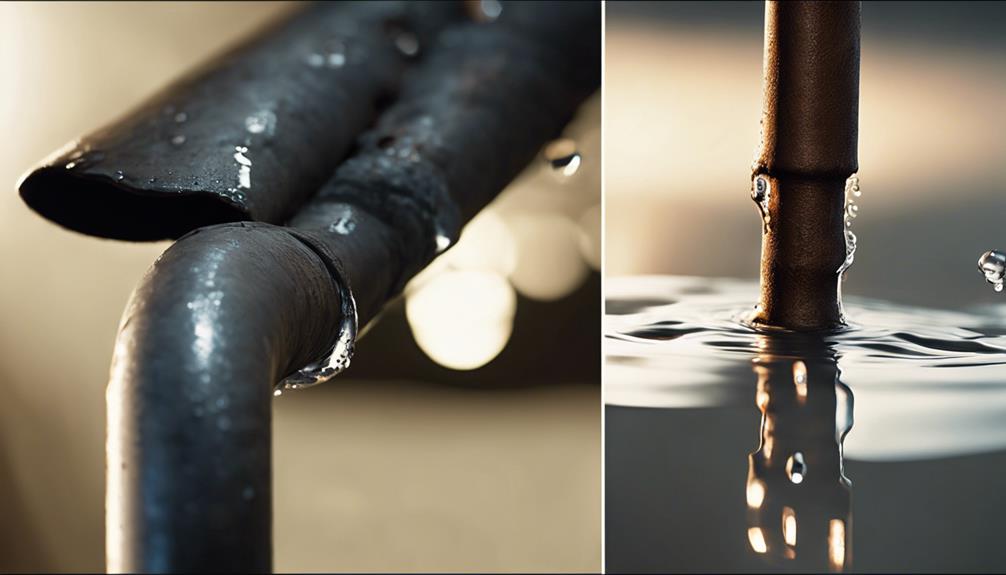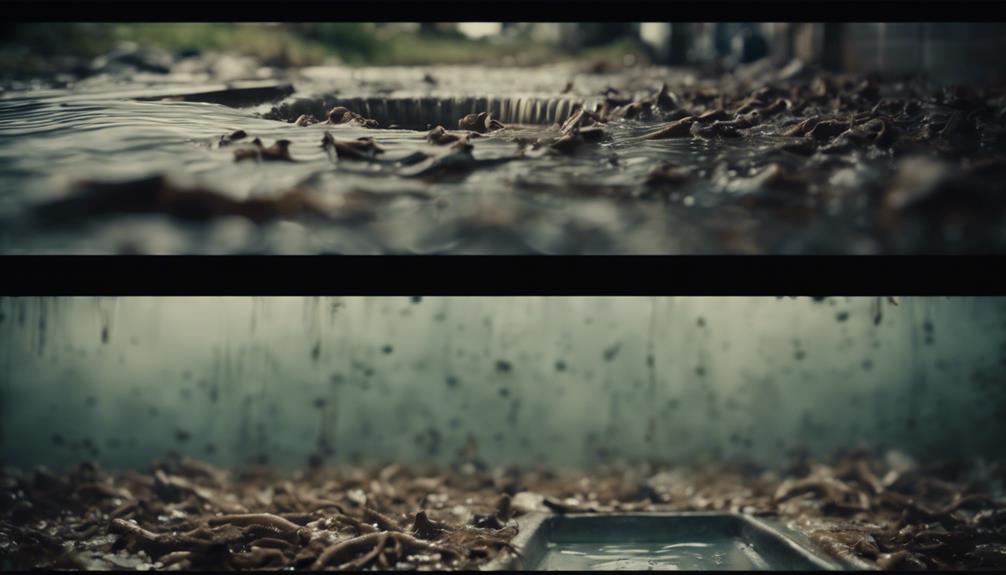You probably don't think about your sink and drain until a clog or leak disrupts your daily routine, but regular inspections can prevent these emergencies and save you from costly repairs. By inspecting your sink and drain regularly, you can identify potential issues before they escalate, reducing the risk of plumbing emergencies and costly repairs. You'll be able to catch hidden leaks, corrosion, and blockages early, preventing water damage and maintaining a healthy plumbing system. By staying proactive, you'll minimize disruptions and guarantee your sink and drain systems run smoothly – and there's more to discover about how these inspections can benefit you.
Safeguarding Your Plumbing System
By investing in regular sink and drain inspections, you'll significantly reduce the risk of plumbing emergencies and costly repairs down the line. This proactive approach guarantees your plumbing system remains in good condition, preventing minor issues from escalating into major problems.
Regular inspections are essential in maintaining a healthy plumbing system, allowing you to identify potential clogs or blockages before they cause backups and water damage. By doing so, you'll avoid costly repairs and damage to your plumbing system.
Early detection of leaks during inspections can prevent water damage and save you from the hassle of dealing with plumbing emergencies. By addressing issues promptly, you'll minimize disruptions and inconveniences caused by plumbing emergencies.
Key Inspection Areas to Focus On
When inspecting your sink and drain system, you'll want to focus on several key areas to make sure everything is functioning smoothly and efficiently.
During your sink and drain inspections, prioritize the connections between sink and drain components, checking for leaks, corrosion, or loose fittings that can lead to water damage.
Next, assess the drainage speed and efficiency to guarantee proper functionality and prevent clogs. Look for signs of mineral deposits or debris buildup in drains, which can cause blockages if left unchecked.
Additionally, test sink stoppers and seals for wear and tear to uphold water efficiency. By focusing on these key inspection areas, you'll be able to identify potential issues before they escalate into major problems.
Consider enlisting the help of professional plumbing inspections to address hidden issues in your sink and drain systems. By doing so, you'll secure that your plumbing system runs smoothly, efficiently, and without the risk of water damage.
Identifying Signs of Wear and Tear

When you're inspecting your sink and drain, you're looking for telltale signs of wear and tear that can indicate deeper problems.
You'll want to pay attention to corrosion and rust spots, as well as any degradation of pipe materials, which can lead to leaks and water damage.
Corrosion and Rust Spots
You can identify signs of wear and tear on your pipes by looking for corrosion and rust spots, which can lead to leaks and water damage if left unchecked. Corrosion on metal pipes can weaken their structure, making them more prone to cracks and breaks.
Rust spots, in particular, are a warning sign that your pipes need attention. If you notice rust spots on your pipes, it may be a sign that they're deteriorating and need repairs or replacements to prevent further damage.
Regular inspections can help catch corrosion and rust spots early, saving you money on costly repairs down the line. By addressing these issues promptly, you can prolong the lifespan of your plumbing system.
Don't wait until it's too late – schedule regular inspections to identify signs of wear and tear before they become major problems. Remember, corrosion and rust spots are warning signs that your pipes need attention. Don't ignore them, or you may end up dealing with costly leaks and water damage.
Pipe Material Degradation
Pipe material degradation can be identified by checking for signs of wear and tear, such as rust, corrosion, or cracks on metal pipes, which can lead to leaks and water damage if left unchecked. As you inspect your pipes, look for visible signs of deterioration, such as rust, corrosion, or cracks on metal pipes.
Don't forget to examine visible pipes and fittings for discoloration, which may indicate degradation and potential issues. You should also check hoses connected to sinks and drains for bulging or fraying, which can be a sign of deterioration.
Remember, addressing any signs of pipe material degradation promptly can prevent more severe problems down the line. By catching these issues early, you can avoid costly repairs and ensure your sink and drain system runs smoothly.
Regularly inspecting your pipes can help you identify potential problems before they become major issues.
Leaks and Water Damage
As you inspect your sink and drain system, look out for signs of wear and tear that can indicate leaks and water damage, such as water stains, mold growth, or soft spots on walls and ceilings. These signs can be subtle, but catching them early can prevent costly repairs down the line.
During inspections, check for loose fittings, cracks, or corrosion in sink and drain components that can lead to leaks. Regular inspections can help you catch minor leaks early, preventing extensive water damage and costly repairs.
Monitoring your water bills for sudden spikes can also indicate hidden leaks in sinks or drains that require immediate attention. Addressing small leaks promptly during inspections can prevent structural damage, mold growth, and costly repairs in the long run.
The Importance of Early Detection
As you maintain your sink and drain systems, it's essential to catch potential issues before they escalate. By doing so, you'll spare yourself the financial burden of costly repairs and water damage down the line.
Early detection is key to avoiding unnecessary damage and ensuring your plumbing systems function smoothly.
Hidden Leaks Detected Early
Detecting hidden leaks early on can save you from the financial and emotional burden of dealing with water damage, mold growth, and costly repairs down the line. Hidden leaks behind walls or under sinks can go unnoticed without proper inspections, but regular inspections can help you identify these leaks before they escalate.
By catching hidden leaks early, you can prevent significant water damage and the subsequent mold growth that comes with it. Professional plumbers use specialized tools to detect hidden leaks, giving you peace of mind that your home is safe from potential water damage.
Early detection is key, and regular inspections can help you avoid the financial burden of costly repairs. With regular inspections, you can rest assured that any hidden leaks will be detected early, and you'll be able to prevent water damage before it's too late.
Preventing Costly Repairs Later
By catching sink and drain issues early, you can avoid the financial burden of costly repairs that can drain your wallet and cause unnecessary stress. Regular inspections are vital to preventing costly repairs later on.
By identifying small problems before they escalate into major plumbing issues, you'll save yourself from the hassle and expense of dealing with catastrophic failures. Addressing leaks or clogs promptly is essential in preventing water damage and protecting your property and belongings.
Investing in regular sink and drain inspections can ultimately save you time and money in the long run. Don't wait until it's too late – stay on top of your plumbing system's health to avoid the financial strain of costly repairs.
Avoiding Unnecessary Damage
Early detection of sink and drain issues is crucial in preventing unnecessary damage to your property, saving you from the financial burden of costly repairs and ensuring a safe living environment.
By catching minor issues early on, you can avoid the headaches and financial strain that come with major repairs. Regular inspections help identify leaks, clogs, and blockages before they escalate into full-blown problems. This proactive approach enables you to address minor issues promptly, preventing them from becoming major headaches.
By doing so, you'll prevent water damage, maintain efficient water flow, and promote a safe and healthy living environment. Additionally, regular inspections help you avoid costly repairs down the line. By staying on top of sink and drain issues, you'll save time, money, and stress in the long run.
Don't wait until it's too late – prioritize regular inspections to avoid unnecessary damage and keep your sink and drain systems running smoothly.
Preventing Costly Repairs and Damage

Regular sink and drain inspections can be your safety net against financial burdens. They help you catch potential issues before they escalate into costly repairs. By doing so, you'll save money in the long run and avoid unexpected emergencies.
Regular plumbing inspections can prevent minor issues from turning into major problems. This proactive approach can help you avoid water damage and costly repairs.
Maintaining Smooth Drainage and Flow
You can breathe a sigh of relief knowing that regular sink and drain inspections are the key to maintaining smooth drainage and flow, saving you from the frustration of dealing with clogs and blockages. With regular inspections, you can prevent clogs and blockages from forming in the first place.
Inspectors will check for debris buildup and mineral deposits that can cause slow drainage and backups in sinks and drains. By identifying and addressing potential blockages early, you can avoid costly repairs and plumbing emergencies down the line.
Specialized tools like cameras can even reveal hidden blockages, ensuring effective maintenance. By maintaining proper functionality through inspections, you can improve the efficiency and lifespan of your sink and drain systems.
This means your plumbing will work better for longer, saving you time, money, and stress in the long run. With regular inspections, you can enjoy the peace of mind that comes with knowing your sink and drain systems are running smoothly and efficiently.
Enhancing Water Quality and Safety

By guaranteeing your sink and drain systems are functioning properly, you're not only preventing clogs and blockages, but also safeguarding the quality of your water supply and protecting your household's health and well-being.
Regular inspections can detect potential issues that could compromise water quality, such as leaks or contamination. This helps prevent the accumulation of harmful bacteria or mold in sinks and drains, promoting a healthier environment.
Here are just a few ways regular inspections enhance water quality and safety:
- Safeguarding against waterborne illnesses: By detecting and addressing issues early, you can prevent the spread of waterborne illnesses that can have serious health consequences.
- Spotting safety hazards: Inspections can identify potential safety hazards, such as faulty plumbing connections or compromised drainage systems, and help you take corrective action.
- Preserving a clean water supply: By preventing clogs and blockages, you can ensure a safe and clean water supply for drinking, cooking, and bathing.
Ensuring Long-Term System Efficiency
Properly functioning sink and drain systems rely on consistent inspections to maintain peak water flow, prevent clogs, and guarantee long-term efficiency. You can't afford to neglect these critical components of your plumbing system. Regular inspections guarantee that water flows freely, reducing the risk of clogs and blockages that can lead to costly repairs.
By identifying hidden leaks and blockages early on, you can prevent water damage and mold growth, saving you money and headaches in the long run. Additionally, regular maintenance through inspections extends the lifespan of your sink and drain systems, ensuring they continue to operate efficiently. This, in turn, enhances the overall functionality of your plumbing system, promoting efficiency and reducing the need for frequent repairs.
Conclusion
As you wrap up your regular sink and drain inspections, you can breathe a sigh of relief knowing your plumbing system is shipshape. Like a master navigator, you've charted a course to avoid treacherous waters of clogs and corrosion.
By staying on top of inspections, you've safeguarded your home from the hidden dangers lurking beneath the surface. Now, your plumbing system can sail smoothly, free from the anchors of costly repairs and damage.